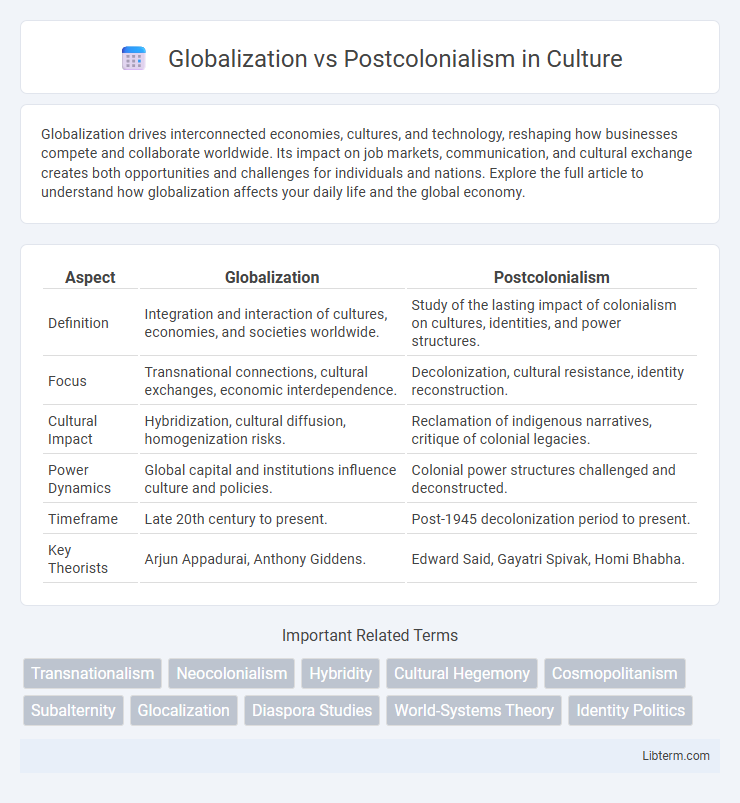Globalization drives interconnected economies, cultures, and technology, reshaping how businesses compete and collaborate worldwide. Its impact on job markets, communication, and cultural exchange creates both opportunities and challenges for individuals and nations. Explore the full article to understand how globalization affects your daily life and the global economy.
Table of Comparison
| Aspect | Globalization | Postcolonialism |
|---|---|---|
| Definition | Integration and interaction of cultures, economies, and societies worldwide. | Study of the lasting impact of colonialism on cultures, identities, and power structures. |
| Focus | Transnational connections, cultural exchanges, economic interdependence. | Decolonization, cultural resistance, identity reconstruction. |
| Cultural Impact | Hybridization, cultural diffusion, homogenization risks. | Reclamation of indigenous narratives, critique of colonial legacies. |
| Power Dynamics | Global capital and institutions influence culture and policies. | Colonial power structures challenged and deconstructed. |
| Timeframe | Late 20th century to present. | Post-1945 decolonization period to present. |
| Key Theorists | Arjun Appadurai, Anthony Giddens. | Edward Said, Gayatri Spivak, Homi Bhabha. |
Introduction to Globalization and Postcolonialism
Globalization refers to the increasing interconnectedness of economies, cultures, and societies worldwide, driven by advances in technology, trade, and communication. Postcolonialism examines the lasting impacts of colonial rule on formerly colonized nations, emphasizing issues of identity, power, and resistance. Both frameworks analyze global interactions, but while globalization centers on contemporary global integration, postcolonialism critiques historical and ongoing inequalities rooted in colonialism.
Historical Contexts: Colonialism and Its Legacies
Colonialism shaped the foundational dynamics of globalization, embedding economic dependency and cultural hierarchies that persist in postcolonial societies. The legacies of imperial domination influence contemporary global trade networks, migration patterns, and cultural exchanges, often reinforcing inequalities between the Global North and South. Postcolonial theory critically examines these historical contexts to challenge and decenter dominant narratives in globalization studies.
Defining Globalization: Concepts and Perspectives
Globalization refers to the complex process of increasing interconnectedness and interdependence among countries, driven by advancements in technology, trade, and communication. It encompasses economic integration, cultural exchanges, and political cooperation on a global scale, influencing social structures and local identities. Perspectives on globalization vary, including neoliberal views emphasizing market expansion and critical approaches highlighting inequalities and power dynamics rooted in historical colonial relationships.
Core Concepts in Postcolonial Theory
Postcolonial theory centers on concepts such as colonial discourse, hybridity, and subaltern agency to critique the lasting impacts of colonial domination on culture, identity, and power structures. It challenges globalization by exposing how economic and cultural inequalities perpetuate neo-colonial practices and cultural imperialism in formerly colonized societies. Key concepts include Edward Said's Orientalism, Homi Bhabha's hybridity, and Gayatri Spivak's subaltern studies, which collectively analyze the intersections of power, knowledge, and resistance in postcolonial contexts.
Cultural Identity in a Globalized World
Globalization influences cultural identity by fostering interconnectedness that can dilute local traditions and values, leading to hybrid cultural expressions. Postcolonialism critically examines these power dynamics, emphasizing the resilience and reclamation of indigenous cultures amidst global homogenization. The tension between global cultural flows and postcolonial efforts highlights ongoing struggles to maintain authentic identities while navigating global influences.
Economic Impacts: Global Markets vs Postcolonial Realities
Globalization drives the integration of global markets, promoting increased trade, investment, and economic growth across nations, yet often marginalizes postcolonial economies by perpetuating unequal power dynamics and dependence on former colonial powers. Postcolonial realities expose how economic structures rooted in colonialism continue to hinder sustainable development and equitable wealth distribution in formerly colonized countries. The tension between global market liberalization and the economic legacies of colonialism reveals persistent disparities in access to resources, technology, and financial capital.
Power Dynamics: Hegemony and Resistance
Globalization reshapes power dynamics through economic hegemony driven by multinational corporations and dominant states, often perpetuating inequalities rooted in historical colonialism. Postcolonialism critiques this dominance by highlighting resistance from marginalized voices that challenge hegemonic narratives and seek cultural and political autonomy. The interplay between globalization and postcolonial power structures reveals ongoing struggles over identity, sovereignty, and control in a rapidly interconnected world.
Literature and Representation: Voices from the Margins
Globalization reshapes literature by amplifying transnational narratives, yet postcolonialism critiques this process for often perpetuating neocolonial power dynamics in representation. Postcolonial literature centers voices from the margins, challenging dominant Western discourses and reclaiming identities through diverse linguistic and cultural expressions. These marginalized perspectives reveal how globalization intersects with historical inequities, offering critical insights into resistance, hybridity, and cultural negotiation.
Hybridization and Cultural Exchange
Globalization accelerates hybridization by facilitating continuous cultural exchange across borders, creating dynamic identities that blend local traditions with global influences. Postcolonialism critiques this process by highlighting power imbalances and the risk of cultural homogenization, emphasizing the resilience of indigenous practices within hybrid spaces. Both frameworks reveal how hybridization challenges fixed notions of culture, fostering complex, multifaceted identities shaped by historical and contemporary interactions.
Toward a Future: Reimagining Globalization Through Postcolonial Lenses
Reimagining globalization through postcolonial lenses involves critically examining power imbalances and cultural hegemonies perpetuated by traditional global economic and political systems. This approach emphasizes the voices and experiences of formerly colonized societies to foster equitable development and cultural pluralism in international relations. Embracing postcolonial critique allows for a more inclusive and just global future, challenging dominant narratives and promoting diverse forms of knowledge and exchange.
Globalization Infographic

 libterm.com
libterm.com